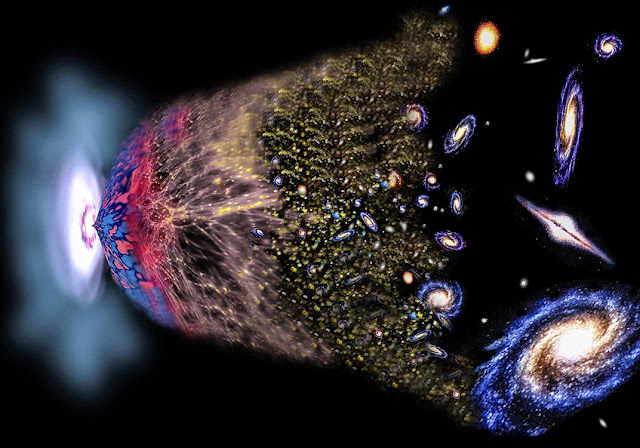The notion of the Big Bang goes back nearly 100 years, when the first evidence for the expanding Universe appeared.
If the Universe is expanding and cooling today, that implies a past that was smaller, denser, and hotter. In our imaginations, we can extrapolate back to arbitrarily small sizes, high densities, and hot temperatures: all the way to a singularity, where all of the Universe’s matter and energy was condensed in a single point.
For many decades, these two notions of the Big Bang — of the hot dense state that describes the early Universe and the initial singularity — were inseparable.
But beginning in the 1970s, scientists started identifying some puzzles surrounding the Big Bang, noting several properties of the Universe that weren’t explainable within the context of these two notions simultaneously.
When cosmic inflation was first put forth and developed in the early 1980s, it separated the two definitions of the Big Bang, proposing that the early hot, dense state never achieved these singular conditions, but rather that a new, inflationary state preceded it.
There really was a Universe before the hot Big Bang, and some very strong evidence from the 21st century truly proves that it’s so.
Although we’re certain that we can describe the very early Universe as being hot, dense, rapidly expanding, and full of matter-and-radiation — i.e., by the hot Big Bang — the question of whether that was truly the beginning of the Universe or not is one that can be answered with evidence.
The differences between a Universe that began with a hot Big Bang and a Universe that had an inflationary phase that precedes and sets up the hot Big Bang are subtle, but tremendously important. After all, if we want to know what the very beginning of the Universe was, we need to look for evidence from the Universe itself.
Read the full article here.

I like the theory our universe grew from a four-dimensional black hole. Or, maybe, once a ultra-massive black hole in our universe reaches a critical mass, makes another universe within ours - expanding into our space and precipitating galaxies which have other supermassive black holes, which in turn makes for more universes to explode into being.
ReplyDelete